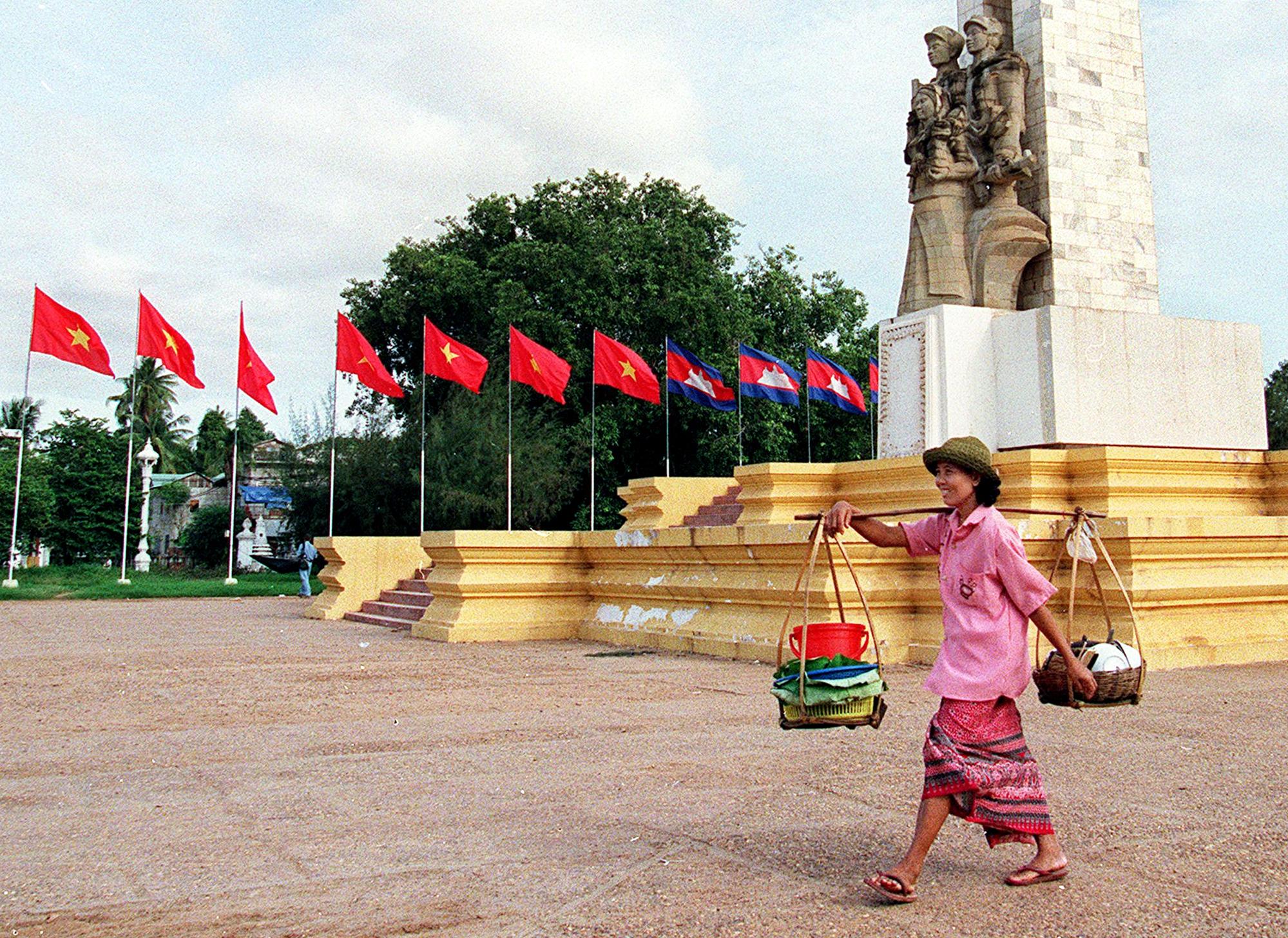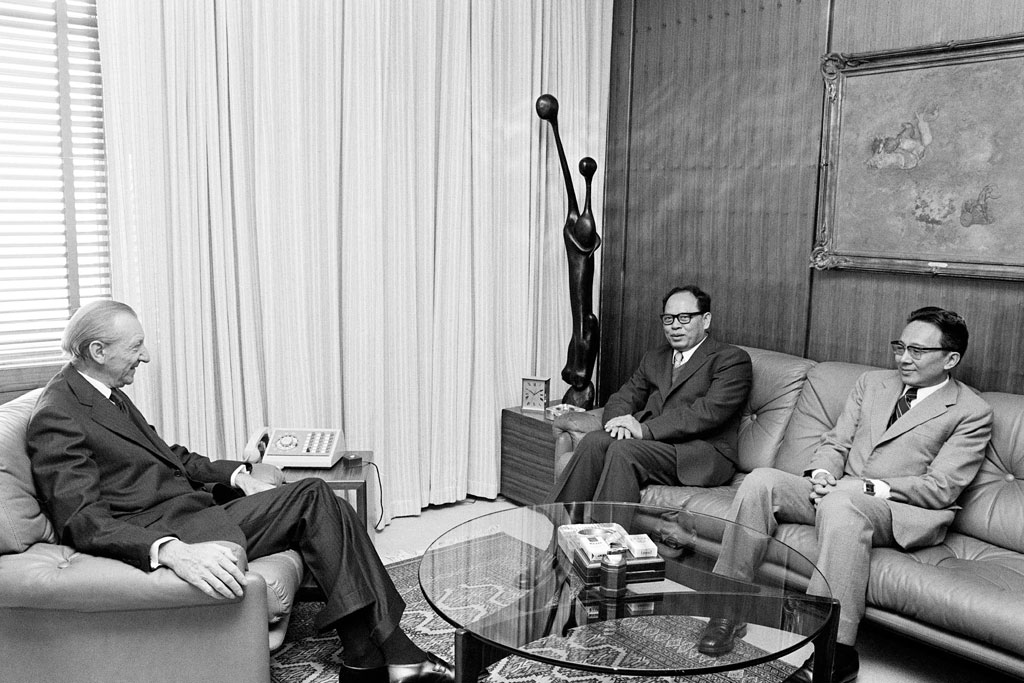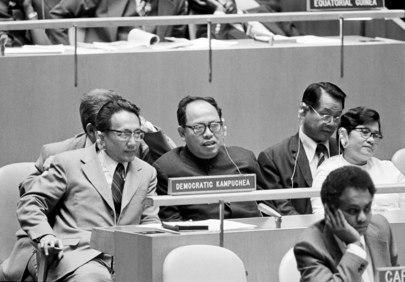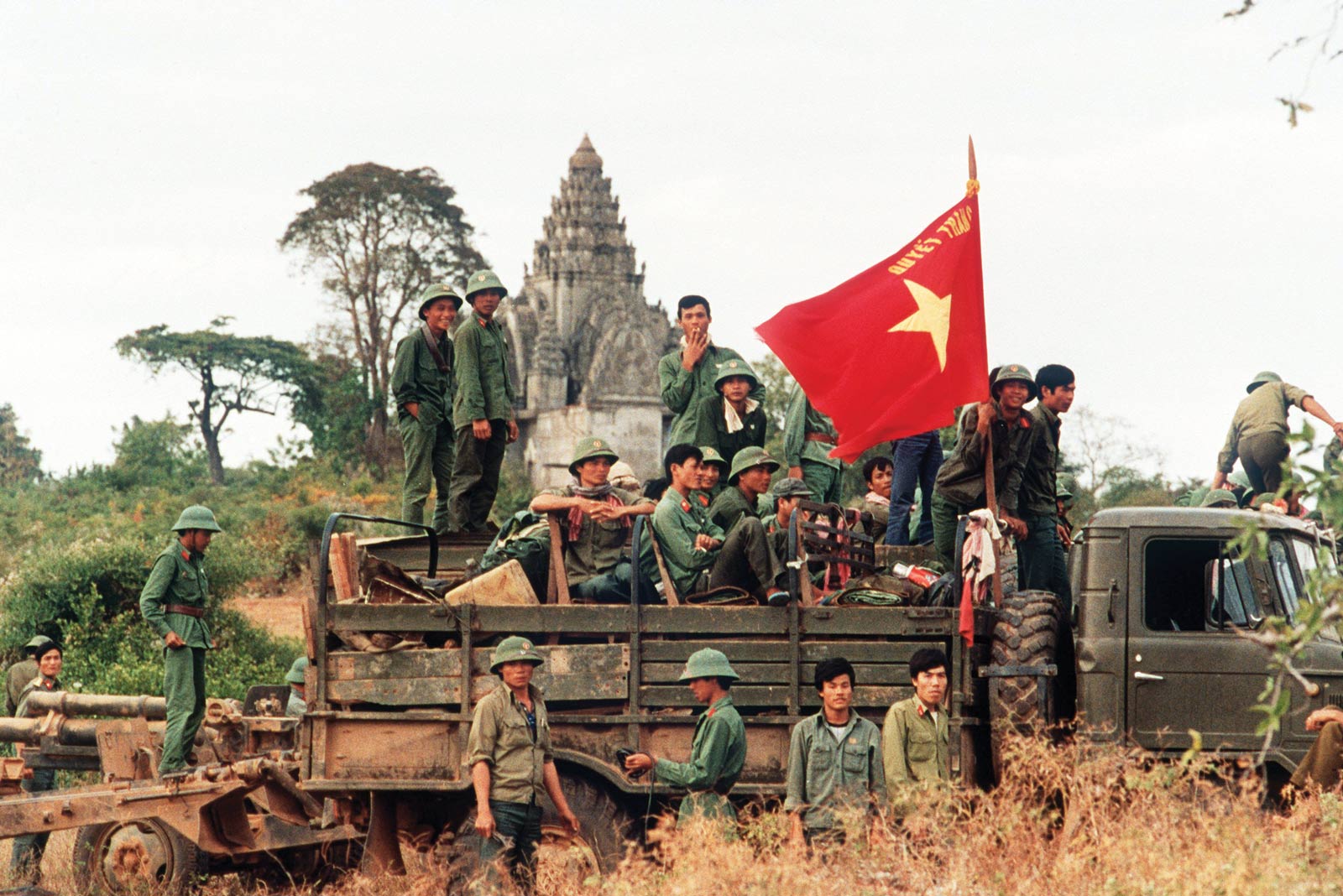Is anti-Vietnamese sentiment on the decline in Cambodia?
Long-regarded as invaders and colonisers in the national narrative, the historically potent enmity shown by many Cambodians towards the Vietnamese is on the wane as the Kingdom's political and economic landscape dramatically shifts

Greeted by a gaggle of reporters as he disembarked a China Airways plane, five-starred red flag emblazoned on its tail, Prince Norodom Sihanouk cut a solemn figure as he talked at what was then New Tokyo International Airport about events unfolding in his homeland in early 1979.
Dressed in an all black button-up shirt and trouser combo, a nod to the Khmer Rouge regime that had installed him as head of state, the monarch bristled as an American journalist suggested all of Cambodia had fallen to the Vietnamese.
“Not all,” he hit back. “The Vietnamese invaders are occupying all of our towns except two, we are still in Battambang, near Thailand, and in Siem Reap Angkor. You know, the famous temples of Angkor – north Cambodia.”
The events in question had occurred just three days prior to this impromptu press conference in the Japanese capital. Almost two weeks after launching a full-scale invasion of Cambodia, Vietnamese troops overran Phnom Penh on January 7, 1979, sending Khmer Rouge troops fleeing towards the Thai border. The Vietnamese would remain as occupying forces for a decade, only vacating under international pressure in 1989.
How to understand these events was, and remains, hotly contested – vacillating depending on who’s talking. In the halls of the politburo in Hanoi, they were liberators overthrowing a tyrannical regime – a narrative backed at the time by the likes of the USSR and the Eastern Bloc. But among much of the international community, not least China and the US, it was an act of foreign aggression – a stance that, in a morbid twist of history, left the Khmer Rouge flag flying outside the UN headquarters in New York as one of the Kingdom’s legitimate representatives until 1992.
Within Cambodia, that troubled period remains no less contentious, and its presence in the national psyche potent. For most, the Vietnamese intervention and occupation represented merely the latest incursion from its expansionist eastern neighbour, covetous of Cambodian land for centuries, and the passing of subjugation from one oppressor to another.
But rebranded Cambodia’s “second birthday” by prime minister Hun Sen on the 40th anniversary of the ouster in 2019, a mood shift in the wider relationship is apparent today. Recent years have have seen the suppression of viable opposition party and the flooding of Chinese capital, transforming Cambodia’s political and economic landscape while seemingly ushering in a waning of enmity towards “Big Brother” next door.



Kimkong Heng is a PhD candidate at the University of Queensland in Australia and a Visiting Senior Fellow at the Cambodian Institute for Cooperation and Peace. He points to the demise of Cambodia’s main political opposition, the Cambodia National Rescue Party, since 2017 as leading to a softening of sentiment towards Vietnam among Cambodians.
“The absence of the pervasive anti-Vietnam political narrative, mostly promoted by the opposition party [CNRP], allows the Cambodian government more freedom to engage Vietnam and to enhance the Cambodia-Vietnam relations,” he told the Globe.
Installed by the Vietnamese as prime minister in 1985, Cambodian political discourse has seen opposition groups, most prominent among them the CNRP and its leader Sam Rainsy, cultivate an image of Hun Sen and his ruling Cambodian People’s Party as stooges of Hanoi. Playing on centuries-old fears of Vietnamese expansionism, the long-rumbling border demarcation issue has been a stick to regularly beat the CPP with, as opposition voices claim the government is readily ceding Cambodian land to gain good graces across the border.
Among Rainsy’s many protestations on the issue came in 2010, when he led villagers in Svay Rieng in physically pulling up border markers that were, he said, encroaching on Cambodian farmland. He was subsequently charged with racial incitement and destruction of property. Year-long protests led by the opposition group also erupted in the wake of the disputed 2013 national elections, in which frustrations regarding perceived Vietnamese influence over Cambodia led to protests outside the nation’s embassy in Phnom Penh, as well as the attacking of Vietnamese people and businesses.
But with the demise of the CNRP in late 2017, dissolved by the Supreme Court under what were widely regarded as politically motivated treason charges ahead of the 2018 national election, the issue of border demarcation has been largely pushed off the agenda.
For Hoang Minh Vu, who has recently completed his PhD in history at Cornell University and is now a Visiting Faculty Member at Fulbright University Vietnam, this democratic backsliding has had the unintended consequence of reducing xenophobia.
“By and large, in the public sphere, that kind of rhetoric [anti-Vietnamese sentiment] has fallen quite a bit – especially since the outlawing of the opposition,” he said. “That is not to say a regression of democracy is in any way a good thing. But it’s just a phenomenon that’s observable – you see less of that rhetoric around.”

Hun Sen has said, if anyone raises questions about demarcation I will put you in jail. Why? How did Hun Sen come into power in the 1980s? Hun Sen made a deal. He was installed by Vietnam, that is the truth, that is history
Mu Sochua, CNRP deputy leader
Now, as CNRP leaders face seemingly insurmountable hurdles in their efforts to return to Cambodia following a series of failed attempted homecomings, how relevant the opposition group, and consequently the issue of border demarcation, remain in Cambodian political discourse is now in question.
Sok Udom Deth, Associate Professor of International Relations at Paragon International University in Phnom Penh, told the Globe that without opposition voices keeping the issue on the agenda, it is increasingly fading in the consciousness of the average Cambodian.
“In people’s minds they are still concerned, but it’s not as politicised given the lack of the opposition party’s presence. Whether the public is still with them [the CNRP] on this issue is maybe fading to be honest,” he said. “If the issue [of border demarcation] was not there, then they could not have politicised it. However the opposition made it a bigger deal than what the people in general would have felt about it.”
Whether border demarcation would always have been high on the agenda among the average Cambodian citizen, or it was a nationalist sensitivity stoked by factions of the opposition, it’s clearly an issue Hun Sen and the CPP is keen to keep off the radar.
On July 31, Rong Chhun, a member of the Cambodia Watchdog Council and long-time community advocate, was arrested for inciting social chaos following a Facebook post in which he said 106 Cambodian families had lost 60ha of land due to incorrect demarcation with Vietnam. He had a bail request denied in November and remains in custody.
For Mu Sochua – the exiled CNRP deputy leader, who herself is facing a litany of charges in an ongoing incitement and treason trial – just because the issue has been silenced, it doesn’t stand to reason that it was a creation of the opposition.
“I would like to correct this misrepresentation of the CNRP. I don’t think it is right to say that we are inciting or manipulating the sentiment of the people,” she responded when asked of accusations of her party dog whistling and stoking nationalist fervour. “We’re talking facts, we’re talking truth. Cambodian farmers have been losing their land, the land of their ancestors along the border – and not just the Vietnamese border.”
Not missing a beat, seamlessly stepping back onto the soapbox she and her party were forced from in 2017, Sochua turned to the legacy of 1979, the decade-long Vietnamese occupation and Hanoi’s unbreakable grip over Cambodia’s current leadership for the explanation of why the ruling party is keen to suppress the issue.
“Hun Sen has said, if anyone raises questions about demarcation I will put you in jail. Mr Rong Chhun, anybody who talks about this issue, is put in jail. Why?” she told the Globe. “How did Hun Sen come into power in the 1980s? Hun Sen made a deal. He was installed by Vietnam, that is the truth, that is history.”

But while the removal of border demarcation from the political script has softened attitudes towards the Vietnamese, within Cambodian borders the emergence of a new boogeyman has also pulled attention elsewhere.
The signing of a comprehensive strategic partnership of cooperation between China and Cambodia in 2010 ushered in a new era of close cooperation between the countries. In the years since, Chinese funds in the Kingdom have become far and away the largest sources of Foreign Direct Investment to reach $16.6 billion by the end of 2019, transforming Cambodian towns and cities as Chinese-backed high-rises become physical markers of shifting allegiances.
In a country with a Gross Domestic Product of just $27 billion, the leverage this level of investment offers the Chinese Communist Party over Hun Sen has become a more immediate and tangible concern for most than a four-decade old alliance conducted behind closed doors.
“In Cambodia, in the past five years, there’s increasingly worry about the Chinese,” Hoang said. “In Cambodia, this is driven really by the fact that so many Chinese businessmen and investors, even all the way down to construction workers, a lot of migrant workers are coming in, especially to the city of Sihanoukville. There’s a massive expansion of casinos and hotels in that city.”
Sam Rainsy, who has been at the forefront of the anti-Vietnamese rhetoric, has turned his attention to China and directed his criticism of the government to China-related problems in Cambodia
Sovereignty and territorial integrity, once the buzzwords of the Vietnam watchers, are now applied to the ever-closer Cambodian-Chinese relationship as fears grow over the potential for a foreign military presence on Cambodia’s increasingly Chinese-dominated coastline.
“The anti-Vietnamese sentiment still exists among Cambodians, although it seems to be overshadowed by the presence and influence of the Chinese,” Kimkong said. “Moreover, Sam Rainsy, who has been at the forefront of the anti-Vietnamese rhetoric, has turned his attention to China and directed his criticism of the government to China-related problems in Cambodia.”
As an ever closer Cambodia-China allegiance attracts some of the ire traditionally reserved for the Vietnamese, and the scrutinising eyes of the opposition and general public turn elsewhere, Hoang speculates as to the space this opens up for a closer Vietnam-Cambodia relationship as those in power in Phnom Penh remain conscious of maintaining a balancing act.
One issue that he sees as ripe for cooperation is the lifeblood of the region, the Mekong river, with upstream Chinese dams increasingly interrupting the vital river’s flow downstream in Cambodia and Vietnam in recent years.
“This is one area where Cambodia and Vietnam will be looking to cooperate even more closely to try to pressure China to be more transparent on how it’s using its dams,” he said. “On this issue, Vietnam and Cambodian interests align almost perfectly.”
But while opportunities for cooperation open, and enmity within Cambodia towards the Vietnamese wanes, for Hoang, this is not a state of affairs that can be taken for granted. Issues such as the estimated 750,000 stateless ethnic Vietnamese living in Cambodia, and whether they should obtain citizenship, remains perhaps the thorniest topic that is yet to be settled between the two governments.
The outcome of those discussions holds the potential to inflame tensions once more.
“This is a very significant bilateral issue. It’s a politically sensitive issue, there are many Cambodians who don’t believe these stateless Vietnamese are deserving of Cambodian citizenship,” he said. “Public sentiment, xenophobia, public feeling fluctuates a lot with economic, social and migration trends. It’s not something to take as perennial.”

